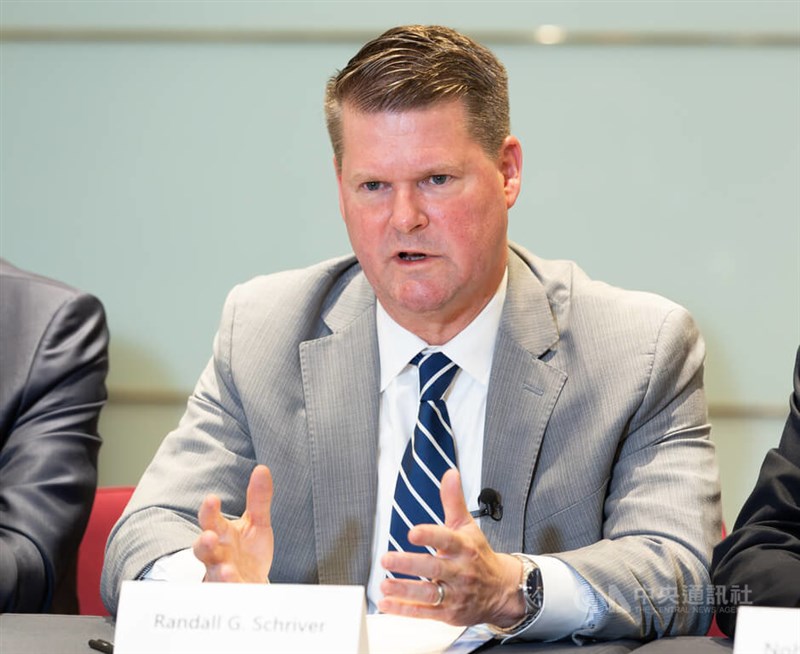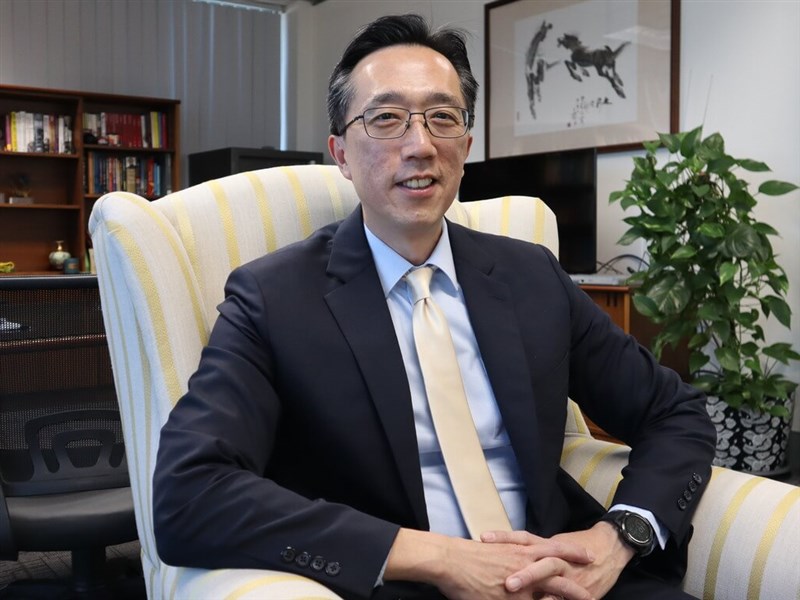INTERVIEW / U.S. intervention hinges on Taiwan's own readiness: Schriver

Taipei, Nov. 15 (CNA) U.S. military support against a Chinese invasion will hinge on Taiwan's preparedness to hold out on its own in the conflict's early stages, former Pentagon official Randall Schriver said Friday.
Schriver, who served as assistant secretary of defense for Indo-Pacific security affairs from 2017 to 2019, was speaking following a tabletop exercise in Taipei jointly hosted by Taiwan's Prospect Foundation, America's Institute for Indo-Pacific Security, and Japan's Sasakawa Peace Foundation.
"If Taiwan cannot hold out long enough, we might not even be able to get to the fight and have a meaningful intervention in order to protect Taiwan. I see Taiwan's own preparation [as] very much tied to our political decision-making in the United States," Schriver told CNA.
Schriver added that preparation should anticipate nonkinetic actions, such as a blockade, and include whole-of-society resilience.
He lauded the Whole-of-Society Defense Resilience Committee created by President Lai Ching-te (賴清德) in June 2024, noting that under the committee's direction, resources are being committed to energy stability, communications, and continuity of government.
"These are really the elements beyond weapon systems that will help Taiwan survive and stand firm in the event of PRC [People's Republic of China] aggression," Schriver said.
Nobukatsu Kanehara, executive director of the Sasakawa Peace Foundation, said Taiwan should increase its oil reserves and reconsider nuclear power, phased out on the island in May, as a wartime energy source.
Despite advances in communications between the U.S. and Taiwan, "where we've identified gaps is the three parties [the U.S., Taiwan and Japan] communicating in real time together, which in peacetime is problematic, [and] in an actual conflict would be potentially very costly," Schriver said.
Retired Japanese Adm. Tomohisa Takei, a senior fellow at the Sasakawa Peace Foundation, and Kanehara, meanwhile, both noted that the armed forces of Japan and Taiwan do not currently hold combined exercises to enhance joint command and control capabilities.
Schriver said that any U.S. decision to come to Taiwan's aid will be "very scenario-dependent," adding that a lack of U.S. forces stationed on the ground in Taiwan and the absence of a formal alliance would be other "practical considerations."
-
![Taiwan's top envoy to Australia seeks cooperation on minerals, drones]() Taiwan's top envoy to Australia seeks cooperation on minerals, dronesAs Australia looks to recalibrate its economic relationship with China, Taipei is hoping to strengthen bilateral ties and partner with Canberra in such areas as critical minerals and drones, said Douglas Hsu (徐佑典), Taiwan's representative to Australia.02/26/2026 11:16 AM
Taiwan's top envoy to Australia seeks cooperation on minerals, dronesAs Australia looks to recalibrate its economic relationship with China, Taipei is hoping to strengthen bilateral ties and partner with Canberra in such areas as critical minerals and drones, said Douglas Hsu (徐佑典), Taiwan's representative to Australia.02/26/2026 11:16 AM -
![Czech author reflects on cultural erasure under authoritarian rule]() Czech author reflects on cultural erasure under authoritarian ruleWhen best-selling Czech author Kateřina Tučková was in Taiwan earlier this month to promote the Chinese version of her novel "The Last Goddess," she said she felt the story would resonate with Taiwanese readers because of a common authoritarian past.02/22/2026 04:35 PM
Czech author reflects on cultural erasure under authoritarian ruleWhen best-selling Czech author Kateřina Tučková was in Taiwan earlier this month to promote the Chinese version of her novel "The Last Goddess," she said she felt the story would resonate with Taiwanese readers because of a common authoritarian past.02/22/2026 04:35 PM -
![Director Tsou Shih-ching challenges gender norms in 'Left-Handed Girl']() Director Tsou Shih-ching challenges gender norms in 'Left-Handed Girl'Superstitions passed down through generations can shape people's lives in subtle yet lasting ways. In her debut solo feature film "Left-Handed Girl" (左撇子女孩), director Tsou Shih-ching (鄒時擎) uses one such belief to examine gender roles and social expectations imposed on women in Taiwanese society.02/22/2026 11:04 AM
Director Tsou Shih-ching challenges gender norms in 'Left-Handed Girl'Superstitions passed down through generations can shape people's lives in subtle yet lasting ways. In her debut solo feature film "Left-Handed Girl" (左撇子女孩), director Tsou Shih-ching (鄒時擎) uses one such belief to examine gender roles and social expectations imposed on women in Taiwanese society.02/22/2026 11:04 AM
-
Politics
Taiwan-U.S. trade deal still in limbo: Premier
03/03/2026 01:06 PM -
Business
Taiwan's consumer confidence weakens slightly in February
03/03/2026 11:07 AM -
Business
U.S. dollar higher in Taipei trading
03/03/2026 10:42 AM -
Culture
Mandopop singer Sun Yanzi to perform at Taipei Dome in May
03/03/2026 10:22 AM -
Society
Heavy rain advisory in effect for Nantou County
03/03/2026 10:16 AM


